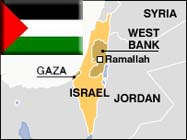Israelis to mark Tabernacles festival, army seals off West Bank
 Tel Aviv - Israel slapped a military closure on the West Bank Monday to prevent potential suicide bombers from reaching Israeli cities during the seven-day Jewish holiday of Sukkot.
Tel Aviv - Israel slapped a military closure on the West Bank Monday to prevent potential suicide bombers from reaching Israeli cities during the seven-day Jewish holiday of Sukkot.
Military checkpoints into Israel and on key West Bank roads leading to settlements will be closed at least until Tuesday next week, an Israeli military statement said.
Palestinians will be allowed to cross into Israel only in urgent humanitarian or medical cases, it added.
"The Israel Defence Forces (IDF) regards the festival of Sukkot, or Tabernacles, as a highly sensitive time. Accordingly, the IDF will be on higher alert in order to ensure the safety of the citizens of Israel, while preserving, to the best of its ability, the daily routine of the Palestinian population," said the statement.
Israel routinely seals off the occupied Palestinian territories during Jewish holidays, a practice started after a Hamas suicide bomber killed 30 Israelis and injured more than 100 others as they were sitting down for the Jewish Passover meal in the Israeli coastal town of Netanya in March 2002.
The Sukkot holiday starts at sunset Monday and ends at sundown Monday next week.
It is part of the Jewish high holiday season, which usually falls in the autumn and began this year on September 29 with the Jewish New Year. It ends next week with the Simhat Torah holiday, which marks the start of a new, year-long cycle of reading from the first five books of the Old Testament.
Sukkot commemorates the 40-year period during which the Jews were wandering in the desert after the exodus from Egypt, probably around the 16th century BC.
Jews in Israel and around the world typically build huts - sukkot (tabernacles) - in their yards and gardens, or on their balconies, symbolizing the temporary dwellings their forefathers lived in while trekking through the wilderness after their liberation from slavery in Egypt.
Religious Jews have their meals and sleep in the huts, which are often decorated by children and must contain four types of leaves and fruit - including palm, myrtle and a willow branches as well as a lemon.
The holiday is also seen as stemming historically from harvest festivals taking place in the autumn.
The joyful, family-oriented holiday comes after and in sharp contrast to last week's Yom Kippur, or the Day of Atonement, the most sacred and solemn day on the Hebrew calendar during which Jews ask for forgiveness for sins committed during the year. (dpa)